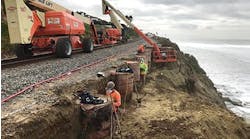The U.S. PIRG Education Fund has announced a new study showing that the number of miles Americans are driving is on the decline, with no signs of increasing.
“The trends highlighted in this report have significant ramifications for Nashville and Middle Tennessee, and further show that the mass transit initiatives put forth by our area leaders are imperative,” said Ed Cole of the Transit Alliance of Middle Tennessee.
“This report proves that due to the increase in traffic congestion, rise of travel costs, and dependence on oil, the next generation’s preference is to move away from the individual automobile model of transportation,” said Betsy Clapsaddle of Transit Now Nashville.
Miles driven per capita peaked in 2004 and the total number of miles driven by Americans peaked in 2007. The average American currently drives no more miles than at the end of President Clinton’s first term.
The baby boomer generation is moving to the end of their peak driving age as millennials are just arriving. The study finds that millennials, America’s largest population, are expected to keep this downward trend in place for the foreseeable future.
The report shows that the millennial generation is leading the change in transportation trends. Those 16 to 34 drove 23 percent fewer miles on average in 2009 than in 2001 — a greater decline in driving than any other age group. The millennial generation is also more likely to want to live in more urban and walkable neighborhoods, and is more open to non-driving forms of transportation than older Americans.
The redevelopment of existing urban areas across the country shows that adults of all ages are willing to embrace the walkable environment. This return to city-living will lead to even less driving over the future.
“The driving boom is over,” said Phineas Baxandall, senior analyst at the U.S. PIRG Education Fund and co-author of the report. “The constant increases we saw in driving before 2005 are unlikely to return. And if millennials’ tendency to drive less becomes the norm as they age, the reduction in driving will be even larger.”
The report notes that while the recession has accelerated the downward trend, there are several key reasons it is likely to hold:
• Millennials, America’s largest generation has shown the biggest declines in driving.
• Baby Boomers, the most driving-intensive generation, is retiring out of commuting age.
• Fuel prices aren’t expected to return to the old times of “cheap gas.”
• Technology may be an important factor, influencing how Americans connect with one another, shopping online rather than driving to the mall, and making transit, bike sharing and other means of travel relatively more attractive.
The demand for The Amp, the proposed bus rapid transit system in Nashville, is clear from these findings. Younger generations as well as the baby boomers are focused on convenience, saving time and money, living healthy, and taking care of the environment — all of which transit does for them.


